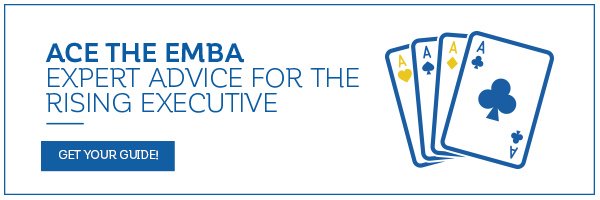

This is the second post in our Ace the EMBA series on how to apply successfully to a top executive MBA program.
The changes in the EMBA applicant/student profile that we explored in the previous post are accompanied by new trends in the EMBA world. Now we will examine two of these trends: changes in sponsorship and GMAT requirements.
Changing company sponsorship requirements/expectations
EMBA applicants’ employers often sponsor their EMBA studies, at least to some extent. This sponsorship ranges from paying 100% of the tuition (rare) to simply accommodating the applicant’s need to take time off from work (almost universal).
This sponsorship picture has certainly changed over the last decade or two. According to the Executive MBA Council’s recent research survey results, the percentage of self-funded EMBA students has grown to 41.2% in 2015. For comparison’s sake, that number was 32% ten years earlier (2005-2006). The numbers then jumped up to 41.2% in 2013, and then back down slightly to 39.8% in 2014.
That same 2006 survey shows that 35% of EMBA students were fully sponsored in 2005. Over the decade, that number dropped to 24% in 2013, and was back up slightly to 24.6% in 2014,
Virtually all EMBA programs take sponsorship seriously and typically require that the employer provide a statement of support for the applicant’s EMBA plans. Here are some samples of EMBA sponsorship expectations:
• Wharton: A letter of endorsement from your organization is a required part of your application. A decision on your application cannot be made until we receive this letter. The letter should be on the official letterhead of your organization and be signed by your sponsoring management, and it must indicate that the necessary time will be provided for you to attend. If financial support will be provided, this should also be specified in the letter. For independent consultants and professionals, a letter of self-sponsorship is required.
• Duke (Global Executive): “A letter from your current employer outlining your company’s support of time is required. This letter may also include information about your employer’s financial commitment (if applicable). Proprietors or principals of a company can provide a letter of self-sponsorship.” (The page also provides a link to a sample letter.)
• MIT: “We consider corporate sponsorship of the time requirement to be critical. In your application package, one of your recommenders should be from your boss, and address the topic of time sponsorship.”
• Kellogg: “Your organization is required to supply a letter stating that it supports and approves the time required for you to attend the Executive MBA Program. If your organization is providing financial sponsorship, please state that in the letter as well. (However, you are not required to have financial sponsorship.)”
Financial sponsorship can still be a competitive plus for applicants, because it underscores your value and high potential in the organization’s eyes. But not having it is not a negative factor.
If you’re an entrepreneur, you basically sponsor yourself – therefore you must indicate how you’ll accommodate the time requirements within the context of your own organization.
It happens too that sometimes regularly employed applicants who are eligible for financial sponsorship may prefer to self-fund, because they do not want to be beholden to their organization and do want instead to be free to pursue other options. Indeed, having time sponsored can create an obligation on the applicant’s part. If that’s not desired, EMBA programs (such as Columbia University’s) that offer a Saturday-only option may be the best option.
GMAT requirements
More and more EMBA programs, including some of the highest ranked such as Kellogg, MIT, NYU, Cornell, Ross (University of Michigan), and Anderson (UCLA), do not require the GMAT (or GRE).
And among those that do require the GMAT, it may be possible to obtain a GMAT waiver under certain circumstances. For example, Goizueta (Emory) requires the GMAT generally but may grant waivers if you can present concrete evidence of sufficient quantitative and analytic capabilities and skills. If you believe you’re eligible, you must request the waiver proactively. Some schools with multiple EMBA program options, require the GMAT/GRE for some programs but not others – those programs targeting the more senior, experienced applicants tend not to require it.
While you may be relieved to be free of this test burden for many great EMBA programs, if you do take the GMAT and score high, it’s worth reporting the score to the schools because it further (a) affirms your preparation for academic work in both verbal and quantitative areas; and (b) shows that you are serious about and committed to the EMBA process. Moreover, if you have a relatively low undergraduate GPA (and don’t have a better grad GPA), submitting a strong GMAT (or GRE) score can mitigate the effect of the academic underperformance to some extent and indicate academic readiness.
Stay tuned: the next post will look at the many types of EMBA programs!
Do you need help applying to your target EMBA programs, efficiently and successfully? Work one-on-one with an EMBA admissions expert for comprehensive application assistance. It’s time to get you ACCEPTED! View our EMBA services here.
Related Resources:
• Top Executive MBA Essay Questions: How to Answer Them Right, a free guide
• Excellent Executive MBA Admissions Advice, a podcast episode
• MBA Admissions Decisions: Should You Go Full-Time Or Part-Time?
The post EMBA Admissions: Sponsorship and the GMAT appeared first on Accepted Admissions Blog.


No comments:
Post a Comment